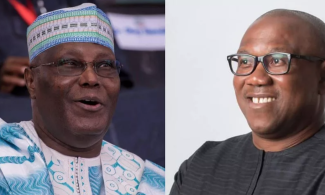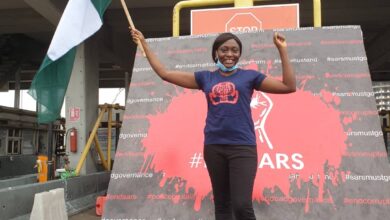Rational Amateurism: The Atiku and Peter Obi Campaigns Compared

You could find low-income voters even in the most unexpected places like Ile-Ife, Osun State who wanted to vote for Atiku because they felt that the PDP managed the economy better and their lives were better under PDP rule (see: https://arbiterz.com/2023-presidential-elections-the-man-who-wants-atiku-to-win-and-break-up-nigeria/).
Yet, I can’t remember a single potentially resonant or original thing that the PDP candidate said or printed during the 2023 presidential elections campaign about its economic record or anything else. Why didn’t the PDP campaign exploit the “suicidal” economic incompetence of the APC/Buhari admin?
“Will the Labour Party make a transition from a party grafted upon a protest movement to a political party with members embedded in every corner of Nigeria that are motivated by a clear set of ideas of how to organize Nigeria politically and run the country’s economy? Better to allow time to tell than place a bet.”
PDP’s incompetence seems completely rational. Why bother with the hard work of finding out what voters cared about most and developing, testing, and deploying the messages that are most likely to motivate them to vote for you when most of them will vote on the basis of ethnicity and religious identities? It seems truly pointless to sell voters a plan to increase their income or access to housing or primary healthcare when they are bent on voting for or against the “Muslim-Muslim” ticket.
Ethnic and religious diversity is God-sent for Nigerian politicians. It has enabled a cynical, lazy, lowest common denominator strategy to bait voters. It is an ingrained habit. Nigerian politicians ignore everything else even when it isn’t in their interest to do so.
Labour Party Politicians are Also Nigerian Politicians
Peter Obi’s Labour Party is no different. Its campaign was extremely poor in offering solutions to Nigeria’s myriad economic problems or exploiting Buhari’s/the APC’s woeful economic record. This is not at all surprising. Nigerian politics is an amateurish endeavour; it’s a 4-month dash rather than a continuing venture to convert citizens and voters to a set of political and economic ideas. (Politicians in power have the privilege of distributing jobs and other menial favours to a few supporters on a permanent basis).
The Labour Party is staffed by Nigerian politicians who have run election campaigns the Nigerian way since 1999. A top-top Nigerian politician who has a vastly superior claim than Peter Obi to being a modern, technocratic politician once told us while working on a campaign for his party to focus not on finding out the public policies that voters would prefer and how we could best pitch these policies to them. He told us to focus on convincing voters that the opponent was sponsoring ethnoreligious conflict! (We cheekily asked for any evidence he could help us with. That was the end of the assignment.)
Polling is Merely Buying Insurance
Nigerian political parties/campaigns are too disorganised to use any polling or analysis of potential drivers of voting behaviour i.e. transform the insights into effective campaign messages. (Try and imagine selling analysis of voters’ intentions to Mr.Dino Melaye, Mr. Yahaya Bello, or Mr. Fani Kayode) A veteran consultant to Nigerian politicians recently asked me, “do they even believe in polling, they just pay you to do it so they can tick that box”. There is often intense maneuvering for control of campaign funds which ultimately gets parceled out between the gladiators and their various consultants. There is usually no centralised control over messaging. The candidate is left to say whatever comes to his mind. Everyone struggles to flatter the big man, who is invariably pronounced “His Excellency”. This does not allow anyone to question his approach or messaging. (I wonder if anyone asked to test how persuasive Peter Obi’s “statistics” were to voters in Kebbi or Ibadan).
Ending the Conspiracy Against Nigerians
It is a chicken-and-egg question: do voters care about/vote for what politicians motivate them with or do politicians mobilise voters using what they know the voters hold most dearly? I think voters do not demand or vote on the basis of policy because Nigerian politicians have “wisely” chosen not to educate or mobilise them on the basis of public policy solutions or options.
Also Read: Obi Leads in Another Poll as Elections are Projected to Enter Run-Off
Whatever one thinks is the answer, it should be clear that we have political parties that are indistinguishable from each other and that are dominated by personalities rather than ideas and that Nigeria is poor because our political parties are not organised on the basis of providing solutions to our economic, social and political problems. In fact, there is a conspiracy by Nigerian politicians to avoid meaningful discussion of the solutions, much less build party membership and mobilise voters on the basis of the solutions.
Why is it important to discuss now, after the presidential elections, why Labour should not run campaigns or function like Atiku’s PDP?
Peter Obi finds himself at a historical junction in Nigeria’s political history where a transition from politics based on personalities and religious and ethnic identities to a political system in which citizens’ political affiliations and votes are based on economic self-interest seems possible. But the situation is fluid. It is possible that the Labour Party under Obi builds on its impressive performance in the 2023 elections by getting far more Nigerians to vote on a strict perception of their individual economic interests, winning more states and even the presidency in subsequent elections.
It is also possible that Labour becomes the new APGA, curtailed to Mr. Obi’s corner of Nigeria. Politicians elected on its platform may be induced to “cross carpet”. There is already a backlash against Labour’s drubbing of the APC in Lagos in the 25th of February presidential elections, with calls for Yoruba people to “ronu” about the takeover of their land by Igbo.
More than dirty chauvinistic ethnic campaigns against the Labour Party and likely APC blandishments to its elected members to join its ranks, the main threat to the Labour Party would be the inability to sustain and build on the momentum that preceded and has followed its brilliant performance in the February 25 presidential election. Labour must, as soon as tomorrow morning, start playing the role of the official opposition party. More than appearing as the official opposition party, Labour needs to make Nigerians, including the opposition, accept it as the obvious next government.
Muslim-Muslim Ticket versus Bread-and-Butter Politics
The Labour Party needs to make Nigerians see that it is the party that understands and has solutions to the economic, political, security, social, etc. problems they are facing in their states and local governments. This requires a manic focus, knowing what to say and how to frame it in the most effective ways that are powerful enough to gradually wean off and inoculate the Nigerian voter against religious and ethnic political mobilisation. If Labour does its work very well, the average Nigerian would feel that it is the only party that talks about his or her problem; other political parties focus on finding enemies for them. Labour Party will talk about how to put food on their table while other parties talk about how their neigbhours pray.
Peter Obi and the Labour Party have to accept that the current party structure and organisation are very inadequate to make the party a dynamic opposition party. It is unfit for the task of broadening Labour Party’s appeal and convincing more Nigerians to vote for a party that would make their lives better rather than parties with candidates who share their ethnic or religious identity. Peter Obi and his party have to accept that their impressive performance in the 2023 elections is more a result of the national mood i.e. Nigerians, especially the young, educated, professional, and middle class, being fed up with the APC and PDP rather than the work it has done to package and sell a programme of national renewal to voters.
The APC has been left to wreck the economy unperturbed since 2015 and get itself reelected because the PDP was dominated by people like Governor Wike. (Former Vice President Atiku’s politics is limited to flying into Nigeria every four years to contest the presidency, it does not encompass any idea of the critical role of opposition in governance). The PDP is unlikely to transform itself into a vibrant opposition that constantly offers alternative policy ideas or vision of Nigeria. This is a big opportunity for the Labour Party.
Improving the Personnel
Peter Obi has to get the young people, professionals and middle classes that voted for the Labour Party into the Labour Party and let them define the values and build the organisational capacity of the party. Obi and Labour Party have made elections competitive, the next task and the one Nigerian can really benefit from is to make governance competitive. They should sell the best ideas on boosting the rural economy and agriculture exports through revamping the infrastructure for agricultural extension services, the best ideas on formalising artisanal training and apprenticeship as a means of boosting productivity and reducing unemployment, the best ideas on improving policing with technology, the best ideas on funding tertiary education etc etc. Nigerians would see a clear connection between Mr. Peter Obi’s statistics and their income, cost and ease of their daily commute, how much they pay for food etc.
Also Read: Vote Buying in Ekiti: Empty Pockets or Crooked Values?
The Labour Party should be a real political party and not a tool for political barons, a model of internal party democracy. By being a vibrant opposition party and constantly expanding membership, its elected officials will have a reason not to cross to the APC. It would be very clear what their party stands for and what voters expect from them. Nigeria will gain when the APC is forced to ditch a balablue approach to public policy and has to match, improve or steal the Labour Party’s policy ideas.
Will the Labour Party make a transition from a party grafted upon a protest movement to a political party with members embedded in every corner of Nigeria that are motivated by a clear set of ideas of how to organize Nigeria politically and run the country’s economy? Better to allow time to tell than place a bet.








An interesting piece but I’d point out a number of things that you missed or ignored.
Labour Party is a party of personality too… in many ways, the worst one. Until Peter Obi cross over to Labour, what did LP stand for? What was its constitution and organizing principle? I’ll give you a hint, it’s in the name… Labour Party is effectively a leftist party that wants socialist protections for the working class (it’s leaders were comrades). Obi’s solutions are conservative market policies. Hence a new Labour Party would have to be transformed by Obi into a vehicle for his and likeminded folks vision. There is no guaranty that this would occur and as proof, I offer their down ballot candidates.